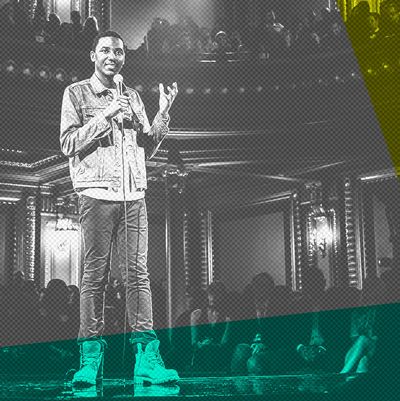
Stand-up comedy is subjective. Duh, you say, all art is subjective. Well, stand-up comedy is very subjective. The audience laughs or it doesn’t, and that has as much to do with the comic creating the comedy as it does with the people who consume it. As a result, I try to avoid framing my comedy coverage as “this comedian is good or bad.” There is stuff I hate that is liked by a lot of people — smart, taste-having people. So it goes. For me, this is a list of the ten specials that best shaped how I saw comedy as a form and medium in 2017.

Dave Chappelle, The Age of Spin (Netflix)
When Dave Chappelle released his two Netflix specials The Age of Spin and Deep in the Heart of Texas earlier this year, after famously spending time away from the spotlight, it was the biggest event in comedy — and together they represented some of the absolute best and worst stand-up that we saw in 2017. The worst was well-documented. It’s not just that most of Chappelle’s jokes about LGBTQ issues were bad because his opinion was wrong; they were also bad jokes: sloppy, poorly thought-out, unoriginal. Yet upon rewatching, those jokes — particularly in Age of Spin — do strangely fit.
The show is about reconciling the bad behavior of good men and the good behavior of bad men, whether it’s O.J. Simpson, Bill Cosby, or Kevin Hart. It’s not about passing judgement, as much as about coming to terms. During the worst part of the hour, Chappelle subtly turns that spotlight on himself by forcing the audience to reckon with his own more ignorant material. You won’t necessarily laugh, but it does challenge you to wrestle with your expectations of Chappelle, and of comedians in general.
It helps that the chunk is surrounded by some of the most structurally interesting stand-up, well, ever. Chappelle is an all-time master of bringing an audience in — talking slowly, growing serious and personal — and using that intimacy to dispense completely unexpected, deeply silly punch lines. I honestly didn’t expect him to come back this good. With stand-up specials being released at an unprecedented clip, I find myself judging them based on the singularity of the viewing experience. There was a ton of funny comedy put out this year, but I was looking for specials that were the most distinct and specific to the person creating them. Based on that, Chappelle makes this list, warts and all.

Marc Maron, Too Real (Netflix)
Marc Maron is one of the few stand-ups primarily associated with a raw, improvisational style. Throughout his career, he willfully sacrificed polish for immediacy. I’m not suggesting that one style is better than another, but there was something exciting about seeing Maron put together a special as put-together as Too Real. Clearly deliberate, he fills the thing with callbacks and act-outs and all manner of stand-up professionalism. Hell, he does a freaking Mick Jagger impression! And all of it feeds into a consistent theme: Where there was a charm to the shotgun blast of Maron’s psyche that defined his earlier work, each section here intensifies when framed by his struggle to accept his own mortality. Whatever he loses by being a bit more polished, he makes up for with the urgency of constantly saying things like, “I don’t know how much time I have left.”

Sarah Silverman, A Speck of Dust (Netflix)
Sarah Silverman’s ability to shed her deeply ironic character for something more genuine and surprisingly spiritual is one of the greatest achievements in comedy over the last decade. It might seem small — “you told one type of joke, now you tell another” — but it’s arguably closer to an athlete going from basketball to baseball than a musician going from guitar to piano. It’s not without precedent in the history of comedy: George Carlin and Richard Pryor, for example, shed popular personas in the pursuit of something greater. However, their shifts now seem like a breakthrough point in the process of finding themselves artistically. Silverman had already found herself, and influenced a generation of comedy in the process. Then she gave it up to find a new self, one less copied and more in line with the culture. So, while it’s not surprising that A Speck of Dust is so good — Silverman is a great joke writer and one of the all-time joke tellers, particularly skilled at pacing and performing her sets — it is that much more impressive.

Hasan Minhaj, Homecoming King (Netflix)
Dating back to turn-of-the-century Jews finding humor in their assimilation to a new country, comics have found comedy in the immigrant experience. With Homecoming King, Hasan Minhaj brought the form into the 21st century with ambition and technological invention. In it, Minhaj burst with an undeniably energy that reflects the importance of his story and its message. Filmed exactly a week after Trump’s inauguration, it’s fair to say Homecoming King is the perfect response to Trump’s Islamophobia and xenophobia, but it’s important to note that the one-man show was first developed in early 2015, well before a Trump presidency was imaginable to most. That speaks to the way that Homecoming King gets at something far deeper than one racist or one administration. It’s not topical, but political in a way that only a deeply personal story can be. Minhaj is an incredibly gifted storyteller, able to beautifully paint the picture of his experience, while zooming out just often enough to convey how his life story is just one of many similar experiences. Homecoming King could possibly be even higher, but Minhaj too often leans on pop-culture references, screaming, or slang as punch lines for my taste. Still, this doesn’t take away from one of the richest stand-up specials in recent memory.

Michelle Wolf, Nice Lady (HBO)
“I probably don’t need to say this, but I should just let everyone know, I am a feminist” is how Michelle Wolf starts Nice Lady, her first stand-up special. One person applauds and Wolf calls that out: “Yeah, one person, that’s all. That’s about average.”
I’ve seen her do this joke in sets around New York, using it as a jumping-off point for her routine about how there are too many types of feminists — those who want to fight for equal pay and those who want to fight to “free the nipple on Instagram,” as two examples — and it always got a laugh. But it’s different at the top of a special. It’s more a declaration of purpose. In the wake of last year’s election, the special is a look at what it means to be a nice lady or not a nice lady in this time. The result is an uncommonly confident, focused hour of comedy, all balanced with Wolf’s tight yet often quite silly joke-writing.

Roy Wood Jr., Father Figure (Comedy Central)
Since Netflix has been swallowing up every stand-up special like the hungriest hippo, Comedy Central put out only four hour-long specials this year. That’s unheard of. I understand why: Netflix pays more. Netflix pays more for production. Netflix probably means more eyeballs. But one thing I like in particular about Comedy Central specials is their length. Comedy Central “hours,” because of commercials, air at about 42 minutes.
I mention that detail because this year I’d often watch specials and think, There isn’t an hour’s worth of material worth paying attention to here. I recently discussed this with a veteran comic, who agreed, noting that most comedians can’t put together an hour of great jokes in the three or so years between specials that is now de rigueur. One might argue that comics should go back to putting out specials less frequently (maybe!), but I wonder why we can’t just make them all shorter. It’s a streaming world: Put out a 37-minute special! Watch how hard the Netflix half-hours by Nate Bargatze and Beth Stelling — to name just two great, short specials — crush.
Or watch how freaking good Roy Wood Jr. is in his debut special on Comedy Central. It helps that Wood is one of today’s best joke craftsmen, who thinks deeply about his words and how different audiences perceive them. In a time of thousands of takes, comedic or otherwise, being shouted constantly, Wood consistently finds unique angles, without just being a contrarian. When he was on my podcast, he told me that his goal was to be a stand-up whose opinion on a given subject people waited to hear. With this debut, he’s well on his way.

Neal Brennan, 3 Mics (Netflix)
There were two one-man shows about jokes released as specials on Netflix this year. (Oddly enough, both originally had off-Broadway runs at the same theater at the same time.) One, Mike Birbiglia’s fantastic Thank God for Jokes, just barely missed the list. The other, Neal Brennan’s 3 Mics … well, you’re reading the blurb for it now. Through deconstruction, with one mic for one-liners, one for traditional stand-up, and one for, what he calls, “emotional stuff,” Brennan was able to show, not tell, his audience what comedy has meant to him: a momentary relief from depression, low self-esteem, and family trauma. Even when he’s joking about football or relationships at one mic, the emotional mic lingers in frame, subtly communicating how the specter of hurt is always there. Brennan’s skill, then, is knowing how to pace extremely raw material with the relief of simple, funny jokes. Stand-up is structurally fairly simple, and Brennan thought of something actually new that successfully elevated the form.

Jen Kirkman, Just Keep Livin’? (Netflix)
While we’re naming bests, let me share my pick for best joke of the year: The closer from Jen Kirkman’s Just Keep Livin’? I can’t quote it here, since it’s not exactly a one-liner. The eight-minute masterwork involves a multilayered point, supported by multiple richly drawn stories that are alternately real, fictionalized, and imagined. It captures everything great about Kirkman’s stand-up: her gift at creating scenes in her storytelling and her faculty at making political points through the personal. In the year or so since Trump’s election, comedians have struggled with how to make good comedy out of someone so dangerous, so discussed, so quick to act impulsively that audiences forget news from only a few weeks ago. Kirkman (who filmed her special before the election), and other comics on the list, like Minhaj, show our best hope by looking beyond the topical to the systemic, to the forces that were present before Trump. They look toward their own experience, because through the individual, we find the universal. In the case of Kirkman, she gives us advice — by way of her ankle tattoo, by way of Matthew McConaughey — on how to move forward: JKL. JK Living. Just Keep Living.

Maria Bamford, Old Baby (Netflix)
Maria Bamford is a genius, able to play with form without the ego or cynicism of many lauded deconstructionists. Her comedy and invention is self-inspired. She has an idea of what she thinks is funny and has enough craft in place to translate it to her audience. In Old Baby, Bamford starts her hour-long set talking to herself in the mirror, then moves on to just her husband, then to a small group of friends, to a small audience … yada yada … then finally to a large theater and back. There is an artifice to stand-up specials — how they’re shot in front of big, gleeful audiences, as if every comedian is the reincarnation of 1980s Eddie Murphy — that never sat well with Bamford, which is why she performed 2012’s The Special Special Special for her parents. Old Baby eschews any sort of aggrandizement, opting instead for something more genuine and intimate. Beyond that, it offers a counterpoint to the conventional wisdom that comedians should be able to be funny to everyone, anywhere, which she mocks in the special. A comedian should be herself with everyone, anywhere. No one is better at that than Maria Bamford.

Jerrod Carmichael, 8 (HBO)
How funny should stand-up comedy be? I know many people — and probably many comics — would quickly respond, “Very! It’s in the name: stand-up comedy. Comedy means funny!”
8 made me not only rethink that assumption, but even start to believe that it’s a fallacy. In a way, this special is similar to Old Baby, prioritizing expression over audience expectation. Comedians I tend to celebrate, like Carmichael and Bamford and much of this list, don’t treat their comedy like they’re a plumber or some other humble craftsman providing a service for a paying customer. Instead, they’re artists with individual visions. 8 is at the top of this list not because it’s the funniest special of the year. It’s not even the funniest released by someone on The Carmichael Show. (Tiffany Haddish’s She Ready! From the Hood to Hollywood! just missed the top ten.) But it was the most fully realized, singular expression of comedic point of view of the year.
Here’s something funny: 8 wasn’t expected to be a masterpiece. After its taping, comedy site Interrobang wrote, “What the Hell Happened at Jerrod Carmichael’s HBO Taping?” The post described a set “ full of prolonged silences, soft-spoken material that was difficult to hear, and instances of repeating material without explanation.” It continued, “It was probably the strangest, most unusual performance I’ve ever seen, especially for something being taped for TV.” Now it’s possible that they just didn’t get it, but I also think it’s because Carmichael and his director, comedian Bo Burnham, had a vision for the special that demanded them to treat the taping this way. They wanted to create a feeling of uncertainty, and the only way to do this and have it feel real was to actually make the people there uncomfortable.
I can’t think of anything in the history of stand-up like 8. The closest is maybe Andrew Dice Clay’s 1990 album The Day the Laughter Died, in which the comedian dropped into a club unannounced and improvised for like two hours. (It’s a favorite of Chris Rock’s — and Rock has asked Burnham to tape his next special.) The difference is, the Clay album, though filled with awkward pauses, was meant to display Clay’s raw talent. 8 is about something deeper.
“I want to care. I want to feel strongly about things.”
“I wish I felt things.”
“I tried to care. I really did. It means a lot to me that you know that I tried.”
These are the sort of phrases Carmichael keeps on coming back to during the hour. Through them, he explores the nature of his own ambivalence, subverting a medium defined by people sharing the things they’ve been obsessing over and the times we’re living in. It’s just so damn human.
Look, don’t worry, the special is also funny, but that’s clearly not the point. Comedy at its best invites you inside the brain of another person, allowing you to think about your own psychology by guiding you through theirs. That’s what Carmichael achieves with 8. The set, recorded a month after the election, starts in close-up with a pause and a question: “Are we going to be okay?” Over the course of the next hour, Carmichael does not really provide an answer. He does not know if we’ll be okay. That’s not what he’s saying. He’s saying that it’s okay to not know. How funny should stand-up be? I don’t know, and neither does Carmichael. But I do know that 8 is the special that best defines 2017.


